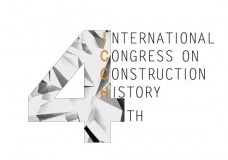
newspaper
eventos
The Écoles nationales supérieures d’architecture Paris-Malaquais, Paris La Villette and Versailles as well as the Conservatoire national des arts et métiers (CNAM) invite you to participate in the 4th International Congress on Construction History. After Madrid (2003), Cambridge (2006) and Cottbus (2009), this event will take place in Paris, from Tuesday 3 July to Saturday 7 July 2012.
By definition, construction history appears as hybrid, associating design to fabrication, the conceptualization phase to the implementation phase. It is thus necessarily interdisciplinary, combining historians and practitioners of all sorts. Construction history is also multifaceted: material, conceptual, patrimonial. With this Fourth International Congress, we are aiming to:
- Reunite a large community of scholars and technicians
The objective is to bring together technical approaches to construction history, already well established and dynamic, while developing its social and cultural dimensions. This is why we are calling for the participation of a large community of established practitioners, established scholars and doctoral candidates, whether they be historians of technology, of art, of architecture, of law or of economy, or archeologists and anthropologists, as well as politicians, architects, engineers, technicians and artisans.
- To identify and initiate new fields of research
- To increase the knowledge base and the appreciation of technologies: the history of construction establishes parallels between traditional techniques and contemporary know-how. It plays a determining role in the knowledge and the conservation of the techniques of the past, as well as in the recognition of this heritage and of its value.
- To give a historical and critical dimension to the current questions of energy savings and sustainability of materials: the history of construction is essential for fundamentally reconsidering the way in which we develop city and countryside and the necessary reconsideration not only of reducing environmental impacts but also of production methods for buildings and urban and rural structures.
- To expand the teaching of construction for architects and engineers: over the last few years, many universities and schools of engineering and architecture have developed history courses within programs dedicated to construction and restoration. The cultural dimension, intrinsically related to the historical prospect, informs the practice of the “design project”.
- To bring teacher-researchers from the various continents closer together
As part of the work undertaken to establish a network of practitioners and historians, the Congress will make a concerted effort to reach out to local, national and continental researchers hitherto barely present in the international debates, notably those coming from: Africa, Asia, South America, the Maghreb, Mashreq and Eastern Europe.
This five day international Congress will alternate plenary sessions and thematically organized parallel paper sessions. Site visits and moments of relaxation and exchange are incorporated into the program. The high quality of debates and paper presentations is guaranteed by the Scientific Committee and the Honor Committee made up of leading experts in construction history. The Organizational Committee is assisted by the National Support Committee.
Papers
Papers should not exceed 5,000 words and 6 illustrations.
The rules and guidelines will be announced later.
Important dates
Call for abstracts open: 14 Jan 2011
• Deadline for abstracts: 15 Apr 2011
• Decision regarding abstracts: 30 June 2011
• Deadline for papers: 31 Dec 2011
• Decision regarding papers: 31 Jan 2012
• Pre-registration deadline: 10 Feb 2012


